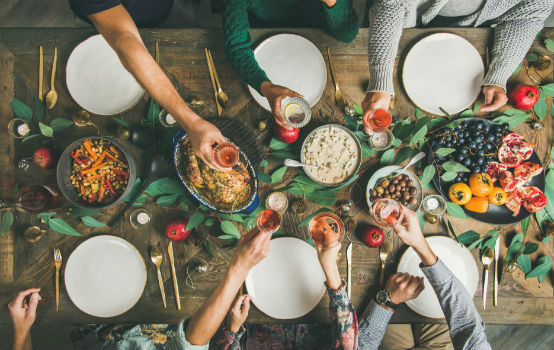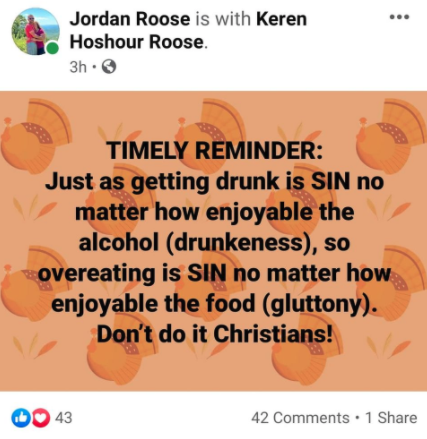Over-Eating is NOT “Gluttony” and You Should Over-Eat to the Glory of God

Mark it down as a near certainty. Everytime Christians get together to enjoy food, some insufferable pietistic kill-joy has to lecture folks on why gluttony is a sin that’s “just as bad” as adultery, drunkenness, or voting Democrat. I hope this short article might forever alleviate that ignorance and you might rightfully put that nonsense peddler in their proper theological place.
I saw such an example of obnoxianity a few minutes ago (see below).

I don’t know Jordan Roose, and he might be a wonderful human who is only insufferable around the holidays, birthdays, and times of general celebration. I bet he’s the life of every party.
And like so many who wag their boney finger at us for feasting during the holidays, Roose alleged that most pastors won’t address this “sin” (probably because they’re a bunch of cowards who pastor a herd of fatties).

The truth must be spoken! All of the Bible passages about Body Mass Index have been covered up in some kind of bizarre, lard-butted Jesuit conspiracy. WHy aREn’T PAStoRs CoNDEMNiNg gLUTtony MoRE OFteN?!?!?
Yeah, so about that. Let me explain why pastors aren’t condemning gluttony more often.
First, and most importantly, gluttony has absolutely nothing to do with over-eating.
As the native party-poopers in your life are already geared up to spiritually accost you for that extra serving of gravy tomorrow, please understand that calorie consumption has nothing to do with gluttony. Zero. Zilch. Nada. You can’t find the two things correlated anywhere in the Holy Canon.
When someone complains about over-eating and conflates it with the sin of gluttony while presuming there’s some kind of worldwide Christian conspiracy to avoid discussing the sin of it, I have a hard time controlling my urge to make the retard face and to thump my chest with a contorted hand. It’s just that stupid.
The problem here is an assumption that gluttony means eating it too much. Or, to put another way, gluttony is when you take in more calories than you burn. And if this is indeed what gluttony is, then yes, there should be a whole lot of repentance going on.
But the Bible simply does not portray gluttony as mere over-eating. While the Bible only scarcely mentions the sin of gluttony at all (which is the real reason few pastors address it regularly), it does indeed condemn it (and one place would be enough).
Gluttony is condemned in Deuteronomy 21:10.
And they shall say to the elders of his city,`This son of ours is stubborn and rebellious; he will not obey our voice; he is a glutton and a drunkard.”
In this passage, the “rebellious youth” is eating and drinking all of his family’s food and drink. The solution is that he be stoned to death (keep reading) because he’s taking what his family needs to survive. The sin is not that the youth was eating to excess, but that he was eating food his family needed to live. There’s no other way to explain the death penalty ascribed to the sin of gluttony. Putting on a few extra pounds doesn’t deserve death, but eating your starving family’s last morsel just might.
Gluttony is condemned in Proverbs 23:20-21.
Be not among drunkards or among gluttonous eaters of meat, for the drunkard and the glutton will come to poverty, and slumber will clothe them with rags.
Notice that those guilty of gluttony are so consumed with their eating they become slothful and lazy, leading to poverty. This isn’t a meal that exceeds the daily recommended caloric intake; this is a lifestyle that spends so much time on sensual self-indulgence you lose your job or become worthless.
Well, there you have it. Those are the two times that the word “glutton” is used in the (KJV) Bible. The word “gluttony” is used zero times. The word “gluttonous” is used on three occasions; twice Jesus is accused of being a glutton for eating with notorious sinners and once Paul accused the Cretans of being “lazy gluttons.”
As best as we can understand the concept of gluttony from Scripture, it is either (A) eating while others around you go hungry (for example taking the last piece of food before others have had even one) or (B) engaging in a lifestyle of self-indulgence that makes you so preoccupied with food or drink that you get lazy.
The word “glutton” itself is from the Middle English word, glotoun, meaning “greedy guts.” So long as everyone else around you is feasting, too, it’s impossible to be a glutton.
There is, however, a third sense in which the word “gluttony” is used in ancient literature from the Near East. A “glutton” is also a food snob, someone who turns up their nose at perfectly edible food because it’s not good enough for their precious pallet. While we don’t have this usage appear in Scripture, it’s clear from other contemporaneous literature that rejecting what’s in front of you is a good working definition of gluttony.
Get the irony, here. While there’s no good evidence to suggest that over-eating is gluttonous, it turns out that the snobby, lecturing vegan who insists on a tofu-turkey and GMO-free everything and insults the feelings of his hosts is a glutton (and that’s probably the obnoxious guy who calls over-eating a sin).
Secondly, God invented feasting so shut up about it already.
God invented – and commanded – the first feast in Genesis 21:8. He goes on to command feasts in places like Genesis 26, Exodus 23, Deuteronomy 16, Leviticus 23, and nearly each and every book of the Old Testament.
God invented – and commanded – seven different annual feasts. Seven! Count them! God commanded feasts for Passover, Unleavened Bread, First Fruits (this one is most like our Thanksgiving), Pentecost (or Feast of Weeks), Feast of Trumpets, the Day of Atonement, and the Feast of Booths (or Tents or Tabernacles).
And in case you’re wondering, a “feast” was not a snack. The word is מִשְׁתֶּה (mish-teh) and means, “banquet” or “spread.” In other words, it’s a whole lot of food.
God’s people have always embraced feasting. And boy, did God’s people know how to do it right. Before refrigeration, food had to be eaten. And so the Jewish people started eating on their feast days in the morning and ate until midnight. Some ancient literature reports that they ate laying down to allow better digestion and that they ate so much they broke out in a sweat! Even modern orthodox Jews refer to the eating required on feast days to be “tedious.”
The notion that feasting is somehow bad probably originates from Roman Catholic ascetism rather than the Holy Bible. Pagans fast when they should instead be celebrating in order to appease the gods. While we are called to an occasional fast to focus on prayer and solemn assemblies, we are called to feast when we are celebrating.
Glory to God, pass the gravy.
Third, not only is over-eating not gluttony, it is not any other kind of sin either per se.
Sure, our bodies are temples (1 Corinthians 16:19-20). And absolutely, there is a principle of stewardship involved if we treat our bodies like stolen rental cars. Jesus is going to raise our bodies from the dead so they’re not recyclable refuse; we should take care of them.
But the burden of proof is on the Thanksgiving Party Pooper to demonstrate that an extra helping of mashed potatoes and getting an extra dollop of whipped cream on your pumpkin pie is going to cause your body irreparable damage. And speaking scientifically, there is zero medical evidence to suggest that occasional feasts are going to give you an early death. In fact, it is far, far more proveable that continual fasting will hurt your body in the long term far more than occasional fasting.
Have you ever heard of a “cheat day”? The best athletes in the world take a day to cram as many calories as is humanly possible into their body to help reset their metabolism and fine-tune it for maximum effeciency.
Do you think Duane ‘The Rock’ Johnson is a glutton? On his feast days he eats 12 pancakes, 4 pizzas, and 21 brownies. Oh, and to top it off he eats 5 pints of ice cream. Now who wants to accuse The Rock of gluttony? Anybody?
While a lifestyle of over-eating is poor stewardship for the body, we have to insist as Christians that sin is lawlessness (1 John 3:4). What law is being broken when someone has double-servings at Thanksgiving?
Answer: None of God’s laws is being broken when you over-eat, and especially when you over-eat to the glory of God to thank him for his abundant provision.
In fact, God equates “fatness” with being blessed in places like Proverbs 11:25 (and many others):
“The generous person shall be made fat: and he that watereth shall be watered also himself.”
There you have it. I’m not gluttonous. I’m blessed, so deal with it.
Christians, we serve an exceedingly wonderful God. He gave you things like nerve endings in your nether regions and taste buds on your tongues because he’s benevolent and kind and good. Saying that over-eating is a sin is like saying that over-sexing (is that a word?) is a sin. And I call baloney on that.
Only when, or if, these good blessings from God get in the way of our productivity and personal health do these things turn into sins. And frankly, the guy who says over-eating on Thanksgiving is a sin is probably the same guy who says love-making is only for procreation.
Personally, I have time for neither suggestion because they are nonsense. Feast this Thanksgiving. Maybe go for a jog the next day to work it off. And let the pietistic party-poopers sulk in the corner with their portion-managed celery sticks while they worship the devil.







I don’t think over indulging a bit on Thanksgiving is the issue, but rather all of the grossly obese fellow Christians you see and are concerned about their health and witness because frequently lack of self-control in one area means it exists in others, possibly when it comes to drinking and smoking. I’m talking about folks over 300 pounds and maybe 400. What are we to think about that?
Are we not to have self-control because I know that when I probably overeat later today I will fill stuffed and very uncomfortable as I want to take care of my body. Is not self-control a Christian virtue? Paul addresses it in 1 Corinthians chapter 9.
Again, it’s not the issue about the occasional over indulging but the daily but doing it on a daily or almost daily basis. It’s what led to my getting diabetes almost 20 years ago, which then caused me to lose 40 pounds, and I never felt better as an adult. And complications from diabetes are what can kill you or cause Infections and hence amputations, although that’s not been the case for me.
Here’s a link to a good study by Steve Lawson from last July:
https://www.ligonier.org/blog/what-self-discipline/
I came here looking for help for getting control over my eating. My eating behavior is reminiscent of my lack of control over alcohol and other drugs. {sarcasm on} Thanks so much for giving me permission to continue overeating . So good to know that it’s not a sin. {/sarcasm off} Seriously, I have gained ~40 pounds in the last 6 months. I am not looking to have someone hit me with a guilt trip for overeating; anymore than I needed or wanted a pastor to tell me I needed to quit drinking. I realized that on my own. Most recently, I quit ingesting cannabis. I didn’t do it because I thought it was sinful, but because I got high when I really didn’t need to. I think if you want to drink, smoke weed or “feast”, that’s between you and God. Not my business. I just would like some help with getting back to eating healthier. It’s my responsibility and not yours. But your article was no help.
I pray blessings for you.